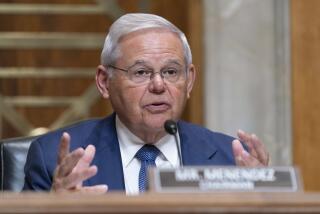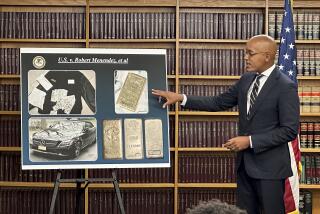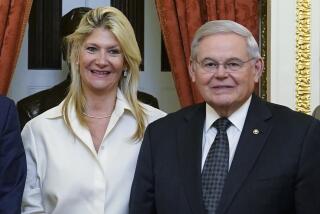Firm at heart of indictment figured in Pakistan dispute
- Share via
WASHINGTON — In the first week of October 1999, Sen. Ted Stevens (R-Alaska) had the government of Pakistan in a delicate position.
The Pakistanis were desperate for the removal of powerful military and economic sanctions imposed after the country conducted nuclear tests in 1998. Many hundreds of millions of dollars in trade was at stake.
Stevens was the chairman of the conference committee that was considering allowing that change. But first, according to Capitol Hill sources, he made it clear that he wanted Pakistan to resolve a multimillion-dollar dispute with an Alaskan construction and engineering company, VECO, owned by his close friend Bill Allen.
It is VECO that is at the heart of the Stevens indictment handed down Tuesday, and prosecutors outlined hundreds of thousands of dollars in financial favors VECO allegedly did for Stevens.
What was less clear was what Stevens did for VECO, though the indictment mentions -- without elaboration -- that VECO asked for his help with projects in Pakistan and Russia, among other favors.
Here is one interaction among Stevens, Pakistan and VECO, some of which was first reported by The Times in June 2003:
The provision giving the White House permanent authority to lift the sanctions against Pakistan appeared to be sailing through Congress -- attached to the Defense Department appropriations bill that was moving through Stevens’ conference committee.
But it ran into trouble with Stevens, who was also the powerful chairman of the Senate Appropriations Committee and its Defense Department appropriations subcommittee.
Stevens raised the issue of a contract dispute VECO was having with Pakistan over payment for VECO’s participation in construction of a pipeline. He wanted Pakistan to resolve it.
Some of the people involved maintain that Stevens said he would not pass the provision until VECO was taken care of, while others said his intervention was more benign.
The bottom line was that Pakistan took Stevens’ complaint as a threat and quickly tried to work things out.
“Sen. Stevens brought the problem to our attention,” Pakistan’s then-lobbyist, former Texas Rep. Charlie Wilson, said in an interview in 2003. “It was a constituent complaint.” A popular movie about Wilson was released last year.
Wilson did not see Stevens’ stance as “a threat.” He said he talked to the Pakistani Embassy about it.
“His constituent had a just grievance with Pakistan,” said Wilson at the time. “The truth is that Sen. Stevens’ constituent was right. . . . Pakistan corrected it.” Wilson could not be reached for comment Tuesday.
Stevens let the amendment allowing for the sanctions to be dropped go through on Oct. 7, 1999, after getting assurances from Pakistan that it would let the World Bank arbitrate the dispute.
It was not the only time Stevens took official action to help VECO.
In the fall of 1999, he earmarked $2.5 million in Labor Department funds to train Russian oil field workers in Alaska.
Allen and VECO and others pushed for the grant because they were having a difficult time finding skilled workers for their oil and gas projects on Sakhalin Island in Russia’s Far East.
In addition to doing extensive remodeling on Stevens’ home, VECO has paid his son, Ben, at least $364,000 in lobbying and consulting fees since 1996.
Ben Stevens, who was an Alaska state senator until last year, has also been ensnared in the VECO scandal but has not been charged.
Ted Stevens issued a statement saying, “I am innocent of these charges and intend to prove that.”
--
More to Read
Get the L.A. Times Politics newsletter
Deeply reported insights into legislation, politics and policy from Sacramento, Washington and beyond. In your inbox twice per week.
You may occasionally receive promotional content from the Los Angeles Times.









